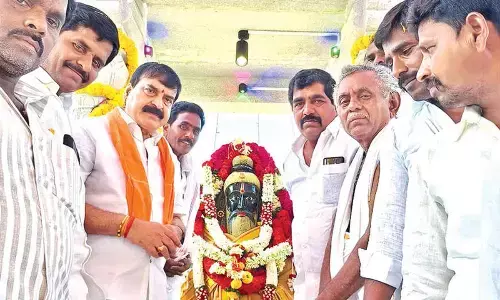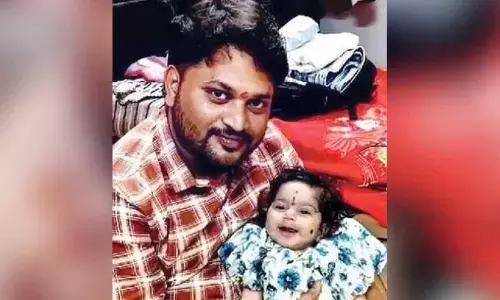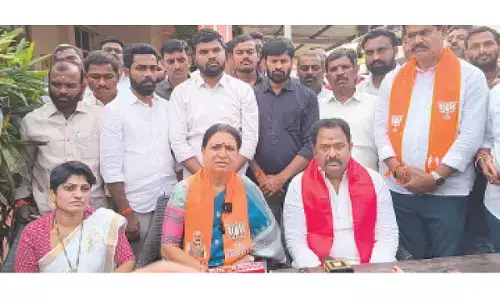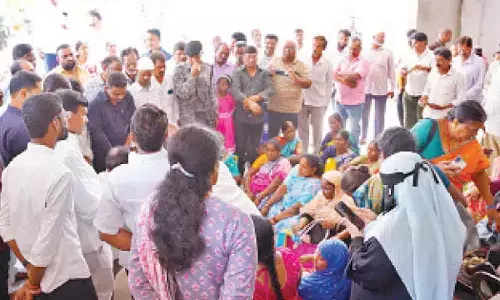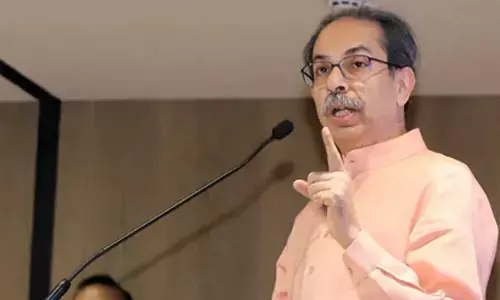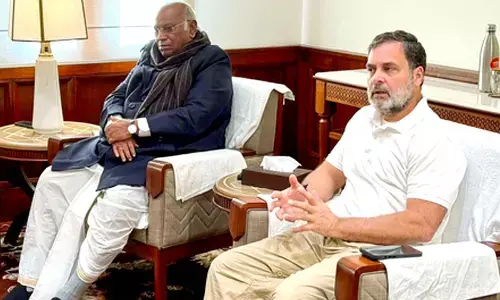The Politics of Language
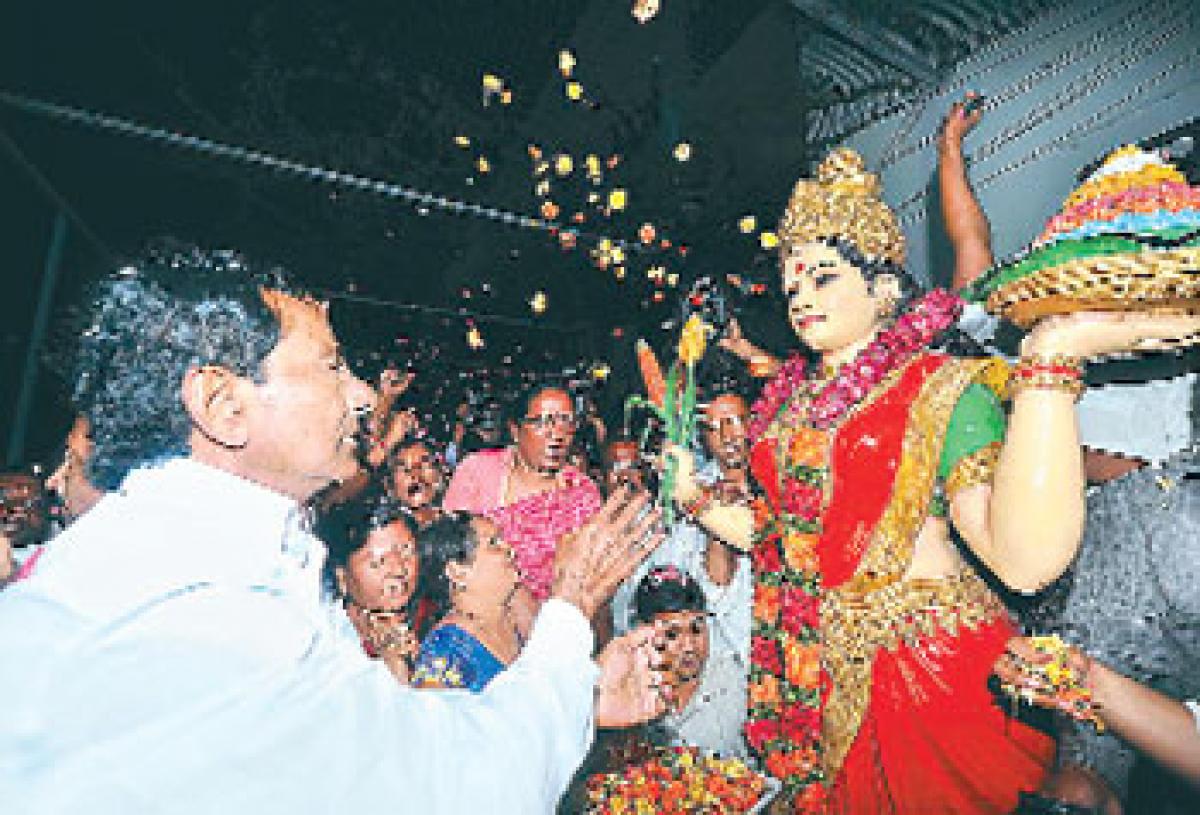
Described ever so beautifully as the “light of the mind”, language is not merely a vehicle for the expression of thoughts, sentiments and values characteristic of a community but represents a fundamental expression of social identity.
The initial euphoria over identity and language has taken a back seat both in Telangana and Andhra Pradesh. The discontent, confusion, delay in bifurcation continues and those at the helm have focussed all their energies in wooing industrialists and outdoing each other in looking at models of development in faraway lands. Language can wait. Telugu can wait...
.jpg) Described ever so beautifully as the “light of the mind”, language is not merely a vehicle for the expression of thoughts, sentiments and values characteristic of a community but represents a fundamental expression of social identity. “The mere fact of a common speech serves as a peculiar potent symbol of the social solidarity of those who speak the language,” says well known linguist Edward Shapir.
Described ever so beautifully as the “light of the mind”, language is not merely a vehicle for the expression of thoughts, sentiments and values characteristic of a community but represents a fundamental expression of social identity. “The mere fact of a common speech serves as a peculiar potent symbol of the social solidarity of those who speak the language,” says well known linguist Edward Shapir.
History is witness to the power of the spoken word since man first learned to communicate, its sway over the masses, ability to rouse passions, bring peace and calm and forge unity for a cause. It is because of this magic that the mere recollection of a speech can evoke visual imagery and bring back memories frozen in time.
There was nothing inherently unified about diverse cultures, religions and languages that comprised the Indian continent under colonialism.
The early part of the nineteenth century saw Indian writers of literature forge cultural unity through their fictional and poetic works. In the 1920’s and 30s literature that tried to unite people who longed to get rid of the bondage of slavery to foreign rulers came to occupy centre stage in the nationalist movement.
The sheer diversity of India led the British to believe that India was unfit to rule itself. Strangely it is this very diversity that came to the fore once again spurring the linguistic division of states after freedom had been won and democracy was being strengthened.
The post independence movements saw the ascent of political movements for the creation of new states on a linguistic basis. 1 November, 1956 saw Andhra Pradesh become one of the first linguistic states after a prolonged struggle.

It was once again language, which played a major role in splitting the Telugu speaking states into two and the emergence of the 29th state of the Indian union 58 years later. What then are the efforts to promote language and culture, which have distinct identities of their own in the two states? Has bias, discrimination and ridicule that had become a major irritant in the past disappeared under the rule of its own sons of the soil in one state and a resolve to surge ahead after losing the coveted capital Hyderabad in the other? The discontent, confusion, delay in bifurcation continues and those at the helm have focussed all their energies in wooing industrialists and outdoing each other in looking at models of development in faraway lands. Language can wait. For the rulers it is politics first and politics forever.
One would have expected spectacular efforts from the governments in both states with respect to language and more so in the state of Telangana where people felt they were subjected to discrimination based on their language, dialect and culture.
But the story is different as gauged from the lack of any initiative and the increasingly disillusioned state of intellectuals in the state who are horrified by the utter indifference of the government. The anger of the people of Telangana over the ridicule of their language and dialect was highlighted first by Prof. Jayashankar hailed as the architect of Telangana and exploited to the hilt by Chief Minister K Chandrasekhara Rao who scored a resounding victory riding on this sentiment but failed to act on it, they feel. “The present government seems to suffer from ‘VIsmarana’ (memory lapse). They feel that they have done enough service to
Telangana literature through honouring three or four selected writers. We had suggested a special dictionary for the Telangana language, its dialect, form and idiom but the rulers have no interest and their advisors are mum. The government has totally let us down,” laments Prof. Jayadheer Tirumala Rao, the President of the Writers Forum, Telangana Rachayitala Vedika. Celebration of Bonalu and Bathukamma at an enormous cost reflect the importance given to religious festivals and cannot be equated to promotion of culture, language and literature which have no place in their scheme of things, he adds.
.jpg) “Telangana language is marked by the diversity of its dialect, tone and tenor and is enriched by folklore that reflects its ethos and culture. In a separate state the citizens hoped for a grand revival and earnest propagation of its culture. It is in the interest of the state that it shows proper intent in preserving, popularising and promoting this language according to people’s aspirations,” says Chukka Ramaiah former MLC who is aware of the huge gap between precept and practise. Unless the rulers get their priorities right, there could be no change in the current lacklustre scenario, he feels.
“Telangana language is marked by the diversity of its dialect, tone and tenor and is enriched by folklore that reflects its ethos and culture. In a separate state the citizens hoped for a grand revival and earnest propagation of its culture. It is in the interest of the state that it shows proper intent in preserving, popularising and promoting this language according to people’s aspirations,” says Chukka Ramaiah former MLC who is aware of the huge gap between precept and practise. Unless the rulers get their priorities right, there could be no change in the current lacklustre scenario, he feels.
Post bifurcation the Telugu Akademi and the Telugu University are both rudderless and in a state of limbo. Both the states have little idea on how to proceed with regard to language says Prof. K Yadagiri, a lover of Telugu language, academician and former director of the Telugu Akademi.
He is pained that the Telugu states have made no attempt to make use of central grants to the tune of 115 crores allocated for the development of Telugu as a classical language and the funds are lying unutilised. “A collection of beautiful essays by Dr. BR Ambedkar translated by eminent academicians into Telugu in three volumes when I was the director have not been released although ten months have lapsed since they were printed.
Eminent Scholar Ravva Srihari’s Telugu translation of Panini’s ‘Ashtadhyayi’ is also gathering dust. No new book has been published by the Akademi, which deals with 600 different subjects, in the past one year. Shortage of paper and staff are cited as reasons for their lackadaisical performance, which is a shame,” says the professor who had even got 4 acres of land sanctioned for the Akademi building during his tenure over where no progress has been made so far.
 Eminent educationist, former director of the Akademi and Joint Director of Higher Education Dr Kondal Rao Velchala is openly critical of the present dispensation in Telangana. Reducing Telugu to merely another language and doing away with it as medium of instruction in government schools according to him is wrought with disastrous consequences.
Eminent educationist, former director of the Akademi and Joint Director of Higher Education Dr Kondal Rao Velchala is openly critical of the present dispensation in Telangana. Reducing Telugu to merely another language and doing away with it as medium of instruction in government schools according to him is wrought with disastrous consequences.
“When the medium of instruction is not Telugu it cannot be the official language. Less than 1 percent of the people will take to the study of Telugu in the present circumstances. The government is shamelessly destroying our language by not providing proper infrastructure, facilities and registrations of Telugu Medium schools and are putting the onus on the citizens saying there “are no takers” for Telugu Medium.
This is an arrogant, faulty and lopsided attitude. Ten years from now Telugu will be in the UNESCO list of dead languages if steps for revival are not taken” he warns. The only way out of this impasse according to him is to continue Telugu as the medium of instruction and encourage translations from Telugu into other languages and vice versa.
Peddibhotla Subbaramayya, Sahitya Akademi award winning author from Vijayawada feels Telugu has been destroyed systematically over the years and continues to be in a pathetic condition due to the neglect of the rulers and bureaucrats, who are unaware of the beauty of a language referred to as “Sundara Telugu” by none other than the national poet Subramania Bharati.
“Many alphabets from Telugu which has a uniqueness absent even in Sanskrit have become redundant and have been replaced by ones that are either meaningless or distort the meaning totally. We have lost certain unique words and have been unable to integrate from other languages either.
 There is a basic mistake in the way Telugu is taught, which can be detrimental to its growth as far as the future generation is concerned” he warns. The dissatisfaction over the Official language commission that is evident in the Telangana State is seen here too, as the organisation is a powerless body which has political appointees heading it. “One would expect a person who has some knowledge of literature to be appointed to head the commission but we were surprised to see a person unknown even locally being given the job,” he says expressing concern over an environment that doesn’t support the dynamic growth of the language.
There is a basic mistake in the way Telugu is taught, which can be detrimental to its growth as far as the future generation is concerned” he warns. The dissatisfaction over the Official language commission that is evident in the Telangana State is seen here too, as the organisation is a powerless body which has political appointees heading it. “One would expect a person who has some knowledge of literature to be appointed to head the commission but we were surprised to see a person unknown even locally being given the job,” he says expressing concern over an environment that doesn’t support the dynamic growth of the language.
Most writers and academicians feel that reticent citizens need to wake up and start a revolution for language revival with the same spirit as the revolution that divided the Telugu states into two. The brewing discontent among people can only be addressed by rulers who look at the importance of language beyond politics and not dispense with language after its purpose has been served.
By:Aruna Ravikumar


